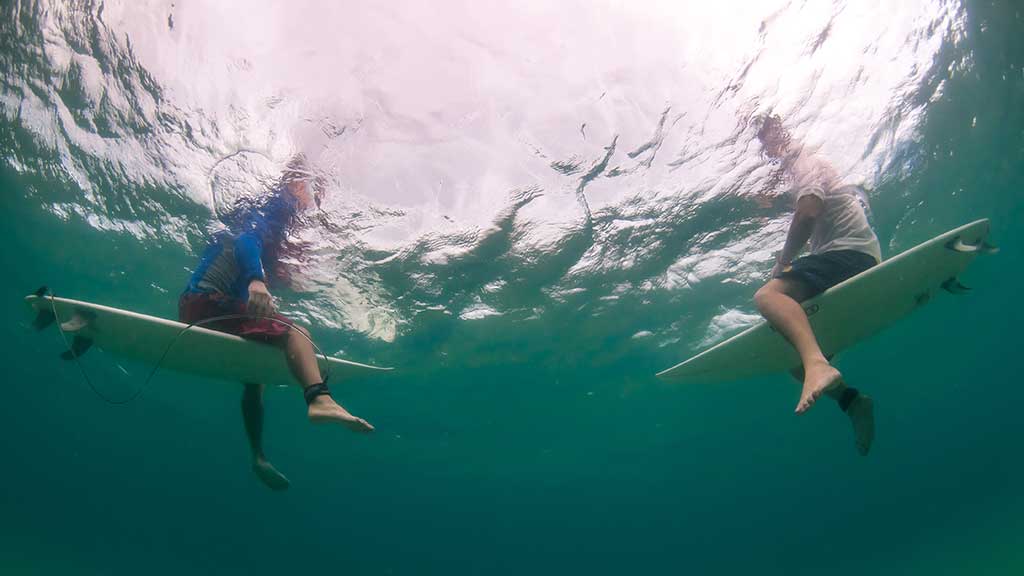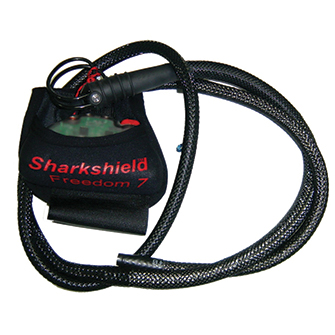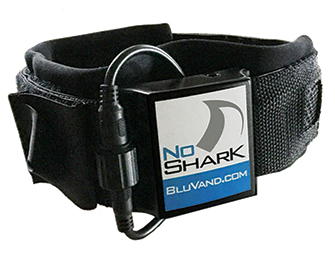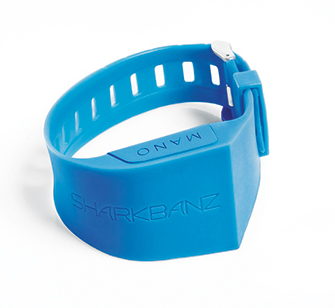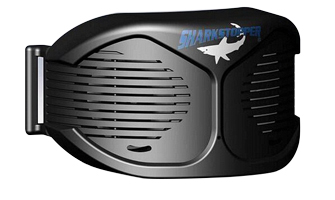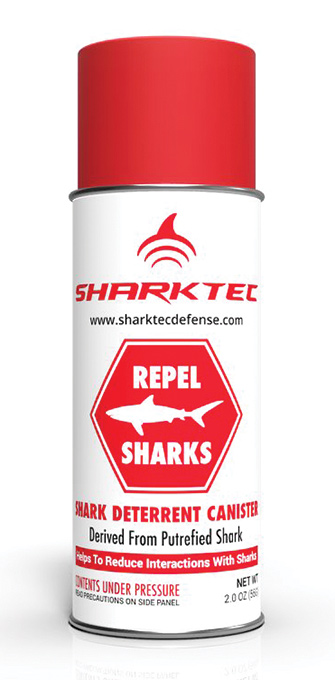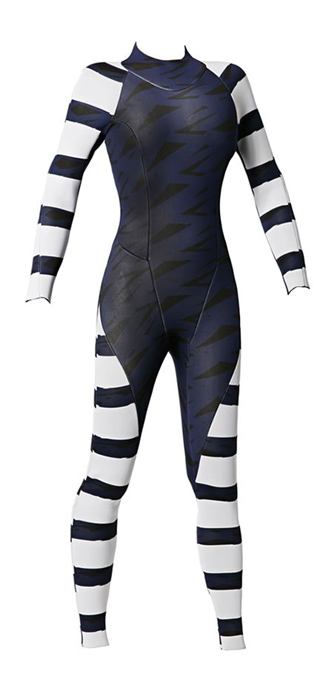Do shark repellents work?
We review the evidence behind Shark Shield, Sharkbanz and Shark Shocker, as well as shark-deterring wetsuits.
Last updated: 6 Jan 2016
The dramatic footage of Australian pro surfer Mick Fanning narrowly escaping a shark attack in South Africa sent chills down our collective spines. And while
the experts say the chance of a shark attack is rare, Fanning’s encounter, along with a spate of other attacks in recent years, has left many people
anxious about sharing the ocean with sharks.
On this page:
So it’s not surprising to see sales of personal shark deterrents or repellents starting to gain some traction. But just how effective are they in preventing a shark from attacking?
Shark-repellent devices claim to reduce the risk of a shark attack by interfering with one of the many senses sharks use to detect their prey – either
sight, smell, hearing, or a special sense that sharks have to detect electromagnetic fields.
Electrical shark repellents
Electrical shark deterrents claim to work by emitting a small electrical current into the water, which interferes with special sensing organs sharks have
in their snout called ampullae of Lorenzini. These organs detect small electrical currents given off by their prey, such as from the heartbeat of a nearby
fish. When overstimulated, the sensory organs spasm, forcing the shark to turn away.
So how effective are electrical shark deterrents at preventing an attack?
Shark Shield is the only electrical repellent on the market that’s been independently shown to be effective at deterring sharks from biting. The electrical field is created by a two-metre cord that trails behind the user. For divers and swimmers, the device is wrapped around the ankle (Freedom 7, $749), while for surfers and kayaks there’s a different model (Surf 7, $749) that requires installation directly onto a board.
While Shark Shield can deter a shark from attacking, it won’t do so every time. The most recent study of the device by scientists at the University of Western Australia (UWA) found it prevented great whites and tiger sharks from attacking most of the time, but it wasn’t always effective. An earlier study by the South Australian Research and Development Institute also found the device was effective in deterring great whites, but noted it didn’t “deter or repel this species in all situations, nor did it repel all individuals”.
And user reports back this up. A South Australian abalone diver told CHOICE he knew of two people who had been attacked while wearing a Shark Shield.
But while Shark Shield has been shown to be effective at least some of the time, it turns out not all electrical repellents are created equally. UWA researchers found that electrical repellents compacted into an anklet were ineffective at repelling sharks.
As Dr Charlie Huveneers, a shark expert at Flinders University explains, “the effectiveness of an electrical deterrent partly depends on the strength and frequency of the electrical pulse they emit and configuration of the electrodes”.
The trailing cord of the Shark Shield means the electrodes are spread far apart, but the electrodes are much closer together on anklet devices, offering less protection.
NoShark ($US399) is one such anklet device that’s currently on the market, and while its manufacturer says it has “encouraging video results” of the device in action, they didn’t respond to our requests for information on their testing.
Surf Safe ($389) is another electrical device that works somewhat differently to the Shark Shield and NoShark, with the electrodes needing to be installed onto a surfboard. While Surf Safe told us it has over 1000 users worldwide and claims to have done “extensive” in-house testing, the company is still waiting on the results of independent testing.
Can electrical devices attract sharks?
If sharks use electrical currents to find their food, wouldn’t strapping an electrical device to your leg actually attract a shark to come in for
a closer look?
That’s a genuine concern for some people, and we’ve been told of surfers using these devices being asked to get out of the water by others nearby.
But Huveneers told us it’s unlikely sharks would be attracted by an electrical shark deterrent.
“Even though sharks are capable of detecting minute electric fields, they mostly use this sense at close range. It’s unlikely a shark would be attracted to
a personal electrical deterrent from a long distance,” he says.
Magnetic shark repellents
The power of magnetic shark deterrence was reportedly discovered by accident, when a scientist inadvertently dropped one into a tank of small nurse sharks
and noticed they quickly darted away. It turns out magnets may have a similar effect on sharks as electrical fields, also overstimulating the ampullae of
Lorenzini and causing an unpleasant sensation in the snout.
Both Sharkbanz ($149) and Shark Shocker ($US35) claim to work using this principle, incorporating magnets into a small band that’s worn on the wrist or
ankle. These devices are considerably cheaper than electrical deterrents, but do they actually work?
Sharkbanz told us its device has been shown to repel a range of sharks, including bull sharks and small tiger sharks, but they don’t recommend it for
deterring great whites. Shark Shocker didn’t respond to our requests for information on its testing.
While there have been no independent studies on the Sharkbanz or Shark Shocker devices, research into using magnets to repel sharks from commercial fishing
lines has generally been inconclusive as to their effectiveness.
Dr Carl Meyer, a shark expert at the Hawaii Institute of Marine Biology, told us that while magnets could work in theory, he isn’t convinced a small
magnetic band strapped to a leg would be effective enough.
“I would need to see some independent, rigorous and peer-reviewed results before buying into their efficacy as a shark repellent,” he says.
Acoustic shark repellents
Killer whales like to eat sharks, so does pretending you’re an orca stop a shark from biting you?
That’s the idea behind the SharkStopper personal shark repellent, the “world’s first and only acoustic shark repellent”, due for release early this
year. The device is a small plastic band that’s worn on the leg and emits a “multi-patented acoustic sound” – a blend of orca calls and a special frequency
its maker says will repel sharks.
But UWA scientists recently found orca calls had limited ability at deterring sharks in the wild. And Dr Christine Erbe, a whale vocalisation expert at
Curtin University, told us that orcas live in social groups – meaning a killer whale vocalisation that works in one place, may not necessarily work
elsewhere.
Erbe points out there’s also the problem of a shark figuring out you’re not actually an orca at all.
“There have been experiments playing orca calls to deter seals from fish farms, but the seals quickly figured out it’s not a real predator and started to
ignore the playback,” Erbe says.
“This might happen with sharks too – we don’t know.”
Spray shark repellents
There’s evidence sharks don’t like being around their dead brethren, so SharkTec has devised a shark repellent spray (Anti-Shark 100, $US25) that
contains an extract of dead shark tissue packaged into an aerosol can. The can is small enough to be carried in a pocket, dive bag or in your hand and
releases a cloud of repellent into the water that SharkTec says creates a “temporary safety zone”. It’s “temporary” because the plume created by the spray
eventually disperses, meaning the sharks may well come back.
SharkTec says its repellent is suitable for a wide range of users, including swimmers, snorkelers and scuba divers. The reality is a spray is only an
option if there is actually time to activate it, a luxury that may not be available in a real-life shark attack.
Changing surfboard colour to repel sharks
In the wake of his great white encounter in South Africa, Mick Fanning decided to change his preferred colour of surfboard from what he called “yum yum
yellow” to blue and black varieties.
The change was inspired by evidence that most, if not all, sharks only see the world in shades of grey, meaning the brightness of an object plays an
important role in whether a shark sees it or not. So can a simple change of board colour really prevent a shark attack? Possibly.
“White, yellow and silvery things are more likely to be approached and bitten by some shark species than blue and green things,” says Dr Nathan Hart, a
neurobiologist from Macquarie University who has studied the visual systems of sharks.
Hart says there’s one downfall though. When viewed from directly below, a surfboard will be seen as a dark silhouette, regardless of its colour. Still, he
says a darker board might reduce the risk of a shark attack from the side, and could be worth a try.
Shark-deterring wetsuits
Black wetsuits have long been scorned for unintentionally making wearers look like seals. But Australian company Shark Attack Mitigation Systems (Sams)
has changed this by designing a range of wetsuits that buck the all-black trend.
The design for divers features a camouflage pattern ($495) in various shades of blue, which Sams says makes the wearer blend into the surrounding water.
There’s also a special wetsuit specifically for surfers ($495), which features black and white banding along the limbs. While it might make you look like a
pedestrian crossing, Sams says the wetsuit is designed to send a warning to sharks that you’re not a yummy treat.
The design resembles the markings of a
banded sea snake, which may be a dangerous food option for sharks. It’s also reminiscent of a pilot fish, which live in close proximity to sharks
without getting eaten.
Sams says its wetsuits are currently undergoing independent testing.
What’s the risk of a shark attack?
Spark up a conversation about sharks and it’s likely someone will throw in a stat or two about you being more likely to die from a cow kick than from a
shark attack. As comforting as that may be, when you’re 20 metres from shore with a plank of fiberglass between your legs or stretching out as part of your
morning swim, the likelihood of a cow kicking you becomes extremely slim, while the chance of being eaten by a shark increases. But only ever so slightly.
“Cases of sharks devouring humans are a very rare event,” says Dr John West, curator of Australia’s shark attack files at Taronga Zoo. “98% of shark
attacks involve a bump or a single bite, and then the shark swims away.”
That said, a single bite can potentially be enough to cause death or permanent injury – not to mention the emotional trauma. And it does appear that
reports of shark attacks are on the rise.
In the 1990s, the average number of unprovoked attacks in Australia was 6.5 per year. That figure jumped to 13 per year over the last decade. In 2015
alone there were 22 unprovoked attacks, including one fatality and 13 injuries.
To put those figures into perspective, more than 1000 people are killed on Australian roads every year. Globally more people died last year taking
selfies than those who’ve been killed by a shark.
And if you’re fearful there are more sharks about, West says it’s a rise in people, not more sharks, that’s driving the rise in attacks.
“More people are going into the water and they’re going into the water more often. This increases the risk of encountering a shark,” he says.
Are shark repellents guaranteed?
The websites of personal shark deterrent manufacturers feature videos of the devices in action and testimonials from happy customers who feel safer using
them. But if you’re looking for a shark deterrent that’s 100% effective, you’re going to be looking for a long time.
All the products we came across clearly state there’s no guarantee they’ll prevent a shark attack. One manufacturer even likened their product to a seat
belt, saying that while seat belts reduce the risk of a fatality in an accident, they don’t completely eliminate it.
This may be true, but seat belts have to comply with a standard to ensure they work as intended, giving the user confidence in the protection they afford.
With personal shark deterrents, very little independent testing has been done, making it hard for consumers to judge if they truly work or not.
“The ability to advertise a device as repelling sharks without having performed adequate testing can be misleading,” says Dr Huveneers.
“It’s important the general public is properly informed about the devices they are purchasing to ensure they make informed decisions about the potential
risks.”
Huveneers also warns that people using these devices should know their limitations, even if they’ve been shown to work at least some of the time.
“There’s a danger with personal deterrents that increased perception of safety may lead to the users taking more risk than they normally would.”
Are shark repellents worth the cost and effort?
If fear of a shark attack is stopping you from entering the water, then forking out for a personal shark deterrent may provide some peace of mind. But be
aware of their limitations – many devices haven’t undergone independent testing, and no device will protect you in all circumstances. And remember, there
are ways of reducing the risk of a shark attack that don’t cost you money or make you dress like a sea snake. It’s a good idea to follow these tips – irrespective of whether you’re using a deterrent or not.
Reduce your risk of a shark attack
The following tips are provided on the Australian Shark Attack File website as ways of minimising your risk of a shark attack:
-
Always swim, dive or surf with other people.
- Avoid dirty or turbid water, which make it hard to see a shark approaching.
- Avoid going into the water at dusk, dawn or at night, as many sharks are more active during these times of the day.
- Avoid swimming or surfing around river mouths, especially after rain.
- Don’t swim with pets.
- Be careful wading through shallow water, particularly where kelp is about, as you may accidentally step on a wobbegong shark.
- Take off jewellery before entering the water. Jewellery reflects light in the same way fish scales do, and sharks can be attracted to the reflected
light.
Shark-reporting app Dorsal
Wouldn’t it be good to know if a shark has been seen in an area before you enter the water? That’s where Dorsal can come in handy. Dorsal is an
app that provides real-time information on shark sightings, crowd-sourced from beachgoers around the country.
The app is free on iPhone and Android, and
allows users to enter details about shark sightings, including information such as time of sighting, the size of the shark, and what type of shark it was
(if known).
Dorsal also features the latest sightings and alerts from authorities, including helicopter surveillance and lifeguard patrols. Once
submitted, the information is immediately relayed to all users via the app and the Dorsal website.
Related

